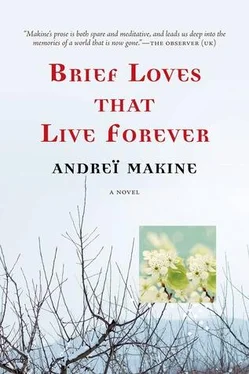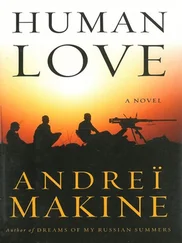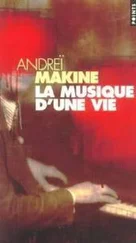Now the story seemed clear, from start to finish. The only mystery that remained was this echo of both grief and serenity reflected in the young woman’s expression. A superstitious fear held me back from putting words to this contradiction, I was afraid lest too much quibbling might destroy the frail beauty of the moment I had experienced as a child on top of the grandstand. With time this puzzlement came to form one of those nebulous memories we avoid clarifying, knowing it is the very haziness of our recollection that makes them dear to us. All I had to do to recall it was to pronounce these words, like a magic spell from my childhood: “She was the very first woman I fell in love with.”
I would have been left with no more than this gentle echo from the past, had I not many years later encountered the same expression of a love, both radiant and tormented, in the eyes of another woman.
A town in the Var in southern France. I am passing through, between two trains, strolling rather at random. A winter’s day, blinding with sunlight and the mistral, it feels as if the force of the blast is going to blow everything away in its shining fury. And everything takes off, the paper tablecloths and napkins on the café terraces, an old gentleman’s hat, which he manages to pin to the ground with the help of his walking stick, plastic bags that become caught on the bare branches of plane trees, shutters that bang, the skirts of passing women’s overcoats, which they thrust down against their buffeted bodies with the gestures of bullfighters … The wind’s eddies of powdered emery hone the sun’s rays, sharpen sounds. Car horns pierce the eardrums, snatches of words slice through the air in little fragments. The town is an old-fashioned photographer’s magnesium flash.
My eyes dazzled, blinking with dust, I take refuge behind a wall and walk, almost groping my way, until I come upon gravestones and crosses. A cemetery, as white as the facades, but behind a row of cypress trees, sheltered from the wind, one can recover one’s wits, breathe, turn one’s back on the sun’s relentless pounding, slow down again …
I am preparing to continue on my way, plunging back into the full force of wind and fire, when suddenly I see a dark smudge, motionless beside a gravestone. The smudge trembles, becomes the figure of a woman, turns, walks along beside the cypress hedge. A young face, eyes iridescent with tears … Drawing level with me, the woman gives me a faint smile and moves away toward the exit. When she is out of sight I go up to the grave she has just left, read the name, do a rapid calculation, alive for eighteen years before the year 2000, plus ten years after it. Twenty-eight. A husband? A fiancé? A brother? Dead the previous year …
In the street the sunlight’s dazzling whiteness reminds me of a brilliant late winter’s day in my native land. An unknown woman seated on that grandstand, profoundly calm, drowsing amid the snows. I have just rediscovered her face in the features of the young woman I passed in the cemetery. Her look of grief and serenity.
I realize this was a very fleeting moment, and yet a vital one in the life of a tortured being. All the pain is still there but love is already breaking free from it and is alive, briefly, in its absolute truth: the world, with its absurdities, its lies, and all its ugliness, no longer comes between the woman and the one she loves.
The world … I remember those steel cages where I flailed about as a child beneath the parade grandstand. And those drab hierarchs saluting the crowd. And the wars and revolutions, and the promises of global freedom and happiness that were proclaimed from the eastern frontier to the western. The thought plunges me into boundless amazement: nothing is left of it all!
At the end of the street I can still make out the young woman in black who has just walked away. An intense feeling of communion. Then her silhouette fades into the impetuous mistral’s blue and gold.
THREE. The Woman Who Had Seen Lenin
First they introduced this man to us. He was in his fifties and very officially exploiting the fact of being one of History’s elect. On Lenin’s birthday, April 22, he was invited into the city’s schools to talk to the pupils about his brief encounter with the Guide, the leader of the proletarian revolution. One morning, as part of his doubtless crowded touring schedule, he visited our orphanage.
Anticipating his coming was a source of great excitement for us. Without exaggeration, it was perhaps comparable to the sensation that might have been caused by the appearance in a late nineteenth-century French primary school of a veteran from Napoleon’s Old Guard, whose fierce mustache had once brushed the emperor’s chubby hand.
The man came in, smiled, spoke with amazing fluency, and indeed verve. He left pauses for us to give gasps of “Oh!” At suspense-filled moments in the narrative he spoke in a whisper. He was a professional. From the very start of his performance we were assailed by doubt.
In the first place he struck us as far too young. We had pictured a hoary, battle-scarred, bent old man. For, since he came from what, for us, was the dawn of time, the period of the 1917 revolution, he must necessarily have fought in the civil war and also the one against Hitler. Yes, we should have preferred a mustached grenadier, or at least the Russian version of this. But he had a smooth, pink baby’s face and looked like the official image of a good little Komsomol apparatchik.
Our history teacher, a very pretty woman in her thirties, was herself taken aback by the visitor’s youthful appearance.
“You don’t look your age at all!” she exclaimed, her cheeks flushing slightly.
The man threw her a frankly saucy wink and murmured, “Ah, that’s what comes of meeting so many beautiful teachers …”
Our doubts were only strengthened.
Could he have been a fraud? This possibility must be ruled out. Ideological education was a highly serious affair and the control exercised by the Party over public lectures of this type was too vigilant. Short of undergoing a lie detector test, the speaker would certainly have been the subject of detailed checks, biographical inquiries, personality tests. For the image of the founder of the State was no laughing matter. Every day in Lenin’s life had been accounted for by an army of historiographers and so there would be no question of allowing an impostor to worm his way into it.
No, the man was not lying; he must truly have met the theorist of communism.
His rather youthful appearance was surprising, but, after all, if he was in his late fifties, purely as regards chronology, he could have been alive for a relatively brief period at the same time as Lenin. We were at the end of the sixties, so the man would have been born around 1910 to 1913. Lenin was able to get about without too much difficulty until 1922, before his illness immobilized him completely. The lecturer was nine years old, he told us, at the time of their historic encounter. So it was believable.
“The meeting was brief,” he explained. “Vladimir Ilyich had come to our village to observe the implementation of the Party’s policy of introducing machinery into rural life. The members of the local soviet were most eager to show him a new tractor. And it was during this demonstration that an appalling catastrophe loomed. It looked inevitable …”
The man’s voice became muted, menacing. He frowned and his nostrils flared, as if he had detected a criminal lurking among us. We listened to him with bated breath, wondering what horrible mishap was about to befall Lenin. We already knew the Guide had suffered an assassination attempt and that in the old days the peasantry, the most ignorant and backward of the working masses, refused to accept the benefits of collectivization. In conspiratorial tones the lecturer whispered, “Although perfectly new, the tractor, the one the soviet was due to demonstrate to Lenin, broke down!”
Читать дальше









